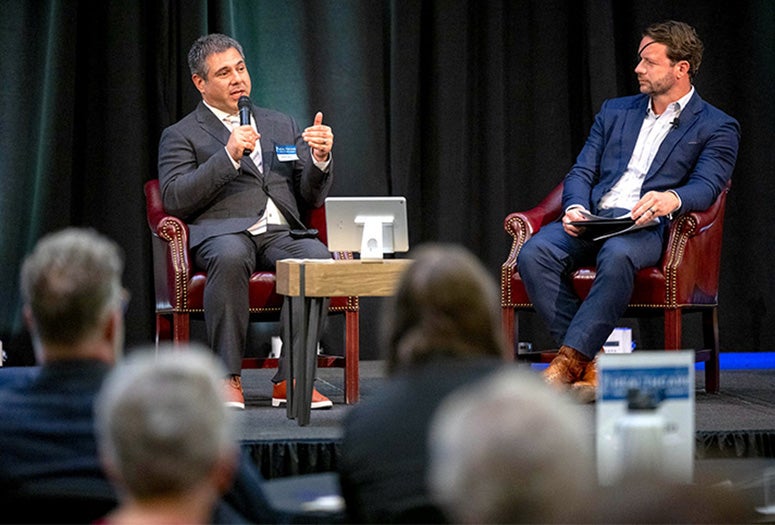
Rice University bioengineer Omid Veiseh joined U.S. Rep. Dan Crenshaw, R-Texas, in conversation at the congressman’s sixth annual Health Care Innovation Summit. Each year, the event brings together leading health care professionals, innovators and industry leaders to discuss the latest advancements in health care from breakthroughs in biotech to advancements in primary care, showcasing their impact in the 2nd Congressional District of Texas and beyond.
“Innovation matters, perhaps more than any other part of the health care system,” Crenshaw said, arguing that innovation is critical for addressing “the greatest and often most costly problems ⎯ from diabetes to cancer to Alzheimer’s.”
Veiseh discussed his work on “implantable, living pharmacies” ⎯ implants containing engineered cells that can produce therapeutics “in vivo in real time,” as Veiseh and collaborators write in a recent Science article. The “biohybrid” technology has the potential to revolutionize drug delivery, making chronic illness management more affordable and attuned to individual patient needs.
“If you had a device that can make decisions in real time, it changes how care is delivered,” Veiseh said, speaking about a project that has received $45 million in funding from the Advanced Research Projects Agency for Health (ARPA-H) to develop an implant that monitors cancer progression in real time and adjusts immunotherapy doses based on the patient’s biology.
“This type of technology would be absolutely transformative for cancer care,” Veiseh said.
Veiseh also highlighted another implantable device being developed to treat Type 2 diabetes and obesity that received $35 million in ARPA-H funding. This technology could produce biologic drugs on demand inside the body, offering a more sustainable and patient-friendly alternative to current treatments.
Other participants at the Oct. 10 summit included Richard Gibbs, who spoke about the impact of the Human Genome Project; Sebastian Caliri, Dr. Clay Johnston and Andy Schoonover, who took part in a fireside chat on health care payment innovation; Dr. Nolan Williams and Dr. Brandon Bentzley, who spoke about neurostimulation technologies; Mahesh Galgalikar and Jason Collins, who spoke about technologies to improve real-time health care monitoring outside a hospital setting; and Keith Kallmes, who discussed the use of AI to support medical research.

